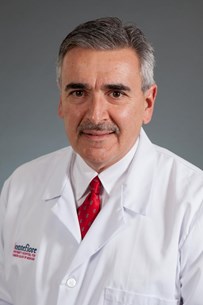Meeting
2021 ASCO Annual Meeting

Montefiore Medical Center/Albert Einstein College of Medicine/Albert Einstein Cancer Center, Bronx, NY
Joseph A. Sparano , Anne M. O'Neill , Noah Graham , Donald W. Northfelt , Chau T. Dang , Antonio C. Wolff , George W. Sledge Jr., Kathy Miller
Background: Systemic inflammation may contribute to cancer progression (PMC2803035), including recurrence of early breast cancer (PMC4828958). We hypothesized that inflammatory cytokines and/or chemokines may be associated with distant recurrence (DR). Methods: We performed a case:control study in women with stage II-III Her2-negative breast cancer, all of whom had surgery and adjuvant chemotherapy (doxorubicin/cyclophosphamide, then weekly paclitaxel) with/without bevacizumab, plus endocrine therapy if ER-positive (PMC6118403). Propensity score matching was used to identify approximately 250 case:control pairs (with/without DR). Serum samples obtained before adjuvant chemotherapy were analyzed using the MSD V-Plex Human Cytokine 36-Plex Kit for detection of human cytokines and chemokines involved in the Th1/Th2 pathway, chemotaxis, the Th17 pathway, angiogenesis, and immune system regulation. Conditional logistic regression analysis, with models fit via maximum likelihood, were used to estimate hazard ratios (HRs) and test for associations. Due to skewed nature of cytokines, HRs are reported on log base 2 scale. If adjusted for multiple testing including 36 markers, a p value of < 0.0014 would be required for statistical significance. Results: A total 249 matched pairs (498 patients) were identified. Covariates used for propensity score matching included age, menopausal status (post 54% vs. pre/peri 46%), ER/PR status (one/both pos 64% vs. both neg 36%) tumor size ( < = 2cm 17%, > 2-5cm 67%, > 5cm 16%) nodal status (neg 15%,1-3+ 32%, 4+ 53%), and grade (low 3%, int. 31%, high 66%). The only biomarker associated with a significantly increased DR risk when adjusted for multiple testing was the proinflammatory cytokine IL-6 (HR 1.37, 95% confidence intervals [CI] 1.15, 1.65, p = 0.0006). Others associated with a 2-sided p value < 0.05 included the chemokine MDC(macrophage-derived chemokine/CCL22) (1.90, 95% CI 1.17, 3.1, p = 0.0098), the T helper cell inflammatory cytokine IL-17A (HR 1.36, 95% CI 1.10, 1.67, p = 0.0052), and the cytokine VEGF-A (HR 1.13 for, 95% CI 1.01, 1.27, p = 0.037). There was no statistical interaction between VEGF-A and bevacizumab benefit. The median and mean value for IL-6 was 0.95 and 7.5 pg/ml (range 0.04-2761.24 pg/ml). Conclusions: This analysis provides level 1B evidence indicating that higher levels of the cytokine IL-6 at diagnosis are associated with a significantly higher DR risk in high-risk stage II-III breast cancer despite optimal adjuvant systemic therapy. This provides a foundation for confirmatory validation of IL-6 as a prognostic biomarker, and potentially as a predictive biomarker for testing therapeutic interventions targeting the IL-6/JAK/STAT3 pathway. Supported by NCI U10CA180820,180794,180821; UG1CA189859,232760,233290, 233196; Komen Foundation; Breast Cancer Research Foundation. Clinical trial information: NCT00433511
Disclaimer
This material on this page is ©2024 American Society of Clinical Oncology, all rights reserved. Licensing available upon request. For more information, please contact licensing@asco.org
2021 ASCO Annual Meeting
Poster Discussion Session
Breast Cancer—Local/Regional/Adjuvant
Breast Cancer
Biologic Correlates
NCT00433511
J Clin Oncol 39, 2021 (suppl 15; abstr 520)
10.1200/JCO.2021.39.15_suppl.520
520
Abstract Disclosures
2024 ASCO Annual Meeting
First Author: Rongsu Qi
2023 ASCO Annual Meeting
First Author: Samuel Aaron Goldlust
2012 ASCO Annual Meeting
First Author: Sara M. Tolaney
2023 ASCO Gastrointestinal Cancers Symposium
First Author: John D Karalis